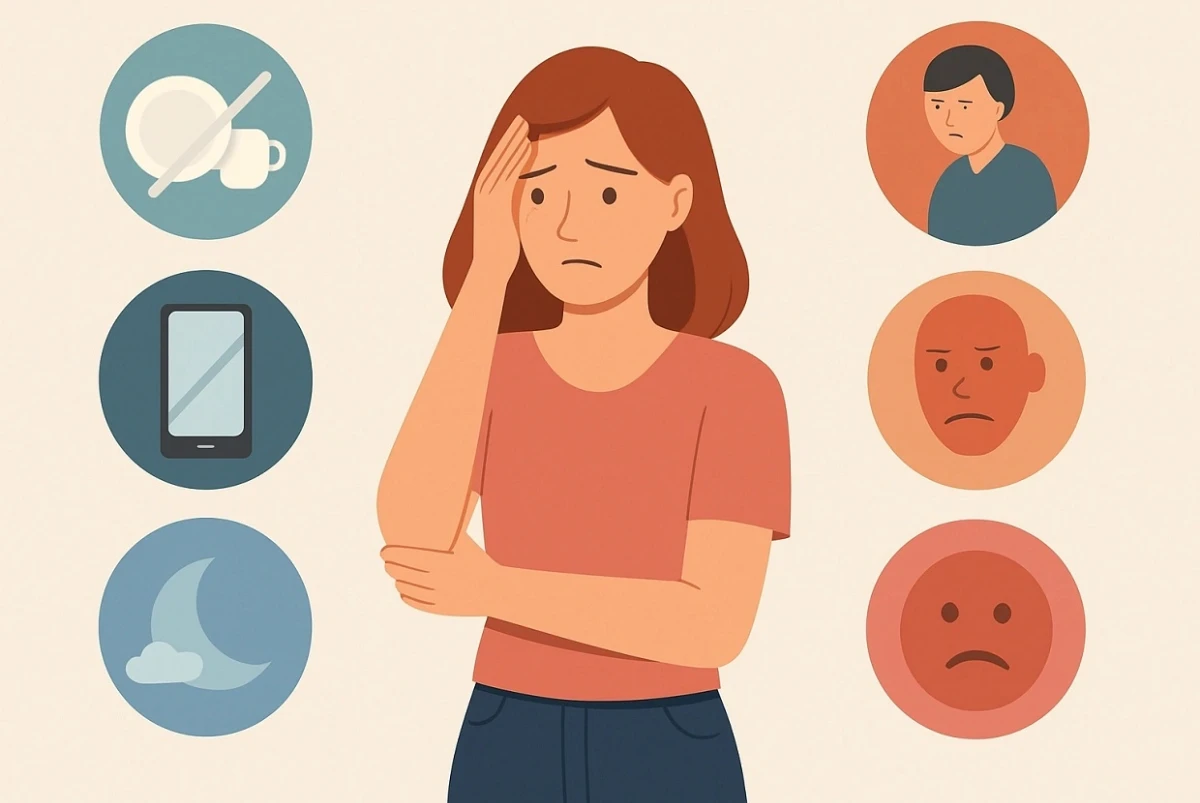Introduction: Are These Daily Habits Secretly Harming Your Health?
We all have some routines that seem normal to us. Like getting up, sitting, checking the phone, skipping breakfast, running around all day, lying down on the sofa, and repeating all this again and again during the day. Have you ever thought that all these small actions are secretly making you sick? If not, then today we will talk about this aspect. The truth is, many of us follow daily habits that harm our health without even realizing it. These habits may seem harmless at the time, but over time they can harm your energy, immunity, metabolism, and even your lifespan.
In this article, we’ll explore 10 daily habits that harm your health, backed by medical research, and suggest simple steps to help you regain control of your body and mind—starting today.
1. Skipping Breakfast—The Silent Metabolic Saboteur
Skipping breakfast may feel like a time-saver or even a weight-loss strategy, but it’s one of the most underestimated daily habits that harm your health. When you skip breakfast, your body goes into survival mode, which slows down your metabolism and increases cortisol (the stress hormone). Since breakfast is most important for our body, skipping breakfast gradually weakens our body along with our brain.
Health Risks Include:
- Blood sugar instability
- Increased cravings (especially for sugar and carbs)
- Mid-morning fatigue and brain fog
- Mood swings and irritability
Why This Matters:
When we study everything from ancient times to present times, we find that people who eat a balanced breakfast maintain a healthier weight, have lower cholesterol levels, and have better cognitive performance.
Solution:
Prefer a high-protein and high-fiber breakfast. Eggs, avocado toast, oatmeal with chia seeds, or Greek yogurt with berries are great options to nourish your body and stay energized throughout the day. And make sure to include fruits in your breakfast as well.
2. Sitting Too Long—The Slow Body Killer
Sitting in one place for long periods of time has been linked to a number of chronic diseases. Whether you’re working from home or binge-watching Netflix, sitting for long periods of time is now considered the “new smoking.” It’s one of those daily habits that harm your health silently but significantly.
How it harms you:
- Decreases circulation, raising the risk of blood clots
- Increases belly fat due to inactivity
- Causes muscular imbalances and back pain
- Can lead to heart disease and even early death
What to do:
Follow the 30-5 rule—let’s understand what 30-5 means. After every 30 minutes of sitting, stand up or stretch for 5 minutes. Use a standing desk or take a walk break during a call. Even a little activity can improve blood flow and reduce health risks.
3. Excessive Screen Time—The Digital Health Trap
In a world glued to devices, too much screen time is easily one of the fastest-growing daily habits that harm your health. On average, Americans spend over 7 hours a day looking at screens—phones, laptops, and TVs.
Side effects include:
- Digital eye strain and headaches
- Tech neck and poor posture
- Sleep disruption from blue light
- Heightened anxiety and social comparison from social media
Fix it:
Install apps like “Screen Time” or “Digital Wellbeing” to monitor your device use. Create a “no-phone zone” like the dining table or bedroom. Use a blue light filter after sunset or wear blue-light blocking glasses.
4. Chronic Dehydration—The Invisible Energy Drain
The presence of water is necessary for every cell of our body. Yet, chronic dehydration is among the most ignored daily habits that harm your health. Even mild dehydration (1–2%) can impair mental performance, energy, and metabolism.
Signs you’re dehydrated:
- Constant fatigue
- Headaches
- Dry mouth and skin
- Difficulty concentrating
Why it happens:
We mistake thirst for hunger or forget to drink water when we’re busy. Coffee, tea and energy drinks act as diuretics, making dehydration even worse.
How to fix it:
Start your day with 1-2 glasses of water. Keep a refillable water bottle nearby. Add lemon, mint, or cucumber to enhance the taste, and drink water regularly.
5. Poor Sleep Routine—The Underrated Immune Killer
Sleep is not just rest—it is your body’s nightly reboot. That is why it is very important for our body to get a good night’s sleep. Not doing so leads to weakness and weight gain in the body. Inconsistent sleep patterns or chronic sleep deprivation are severe daily habits that harm your health. They sabotage both your physical and mental well-being.
Dangers of poor sleep include:
- Increased inflammation and lowered immunity
- Hormonal imbalance (affects hunger and metabolism)
- Greater risk of depression, anxiety, and even Alzheimer’s
- Impaired memory, judgment, and emotional control
Science says:
Sleep affects everything from your skin and weight to your productivity and heart health. Just one hour of sleep loss can reduce your alertness and decision-making ability by 32%.
Fix it:
Follow a regular sleep schedule, even on weekends. Avoid caffeine and screen exposure at least 1 hour before bedtime and 6 hours before bedtime. Install blackout curtains, keep your bedroom cool, and create a relaxing bedtime routine.
6. Mindless Snacking—The Silent Sugar Bomb
Snacking isn’t bad—but it’s important to know what you snack on and why. Emotional or boredom-based eating is one of the sneakiest daily habits that harm your health, especially when your go-to snacks are ultra-processed.
Warning signs:
- You snack while distracted (TV, phone)
- You reach for chips, cookies, or soda during stress
- You’re never truly hungry when you eat
Long-term damage:
These habits promote insulin resistance, weight gain, sugar addiction, and digestive problems.
Solution:
Create a “snack zone”—restrict snacks to the kitchen or dining area. Plan your snacks (nuts, fruit, protein bars) in advance, and always check the label for added sugar.
7. Bottling Up Emotions—The Internal Pressure Cooker
Ignoring or suppressing emotions is one of the most dangerous daily habits that harm your health mentally and physically. Chronic emotional stress can lead to real illness.
Health risks include:
- High blood pressure
- Digestive issues like IBS
- Hormonal imbalance
- Immune suppression
Studies reveal:
Unexpressed emotions can increase your risk of heart disease and autoimmune disorders. Being constantly angry or sad activates stress hormones that damage your body over time.
Fix it:
Practice emotional hygiene. Keep a diary regularly, talk to someone you trust, or seek professional help if needed. Mindfulness exercises such as deep breathing or meditation can help reduce emotional stress.
8. Bad Posture—The Spinal Time Bomb
Whether you’re slouching at your desk or texting with your head bent down, poor posture is one of those daily habits that harm your health physically and mentally. This not only puts pressure on your spine but can also affect your mood.
Side effects:
- Neck and back pain
- Joint stiffness
- Poor digestion and reduced lung capacity
- Decreased confidence and increased fatigue
Posture correction tips:
- Sit with your back supported and your feet flat on the floor.
- Use a lumbar pillow or ergonomic chair
- Stretch regularly—especially chest, neck, and shoulders
- Do posture exercises like wall angels or yoga poses (e.g., cobra or cat-cow)
9. Skipping Physical Activity—The Movement Deficit
A sedentary lifestyle has become the norm, and skipping exercise is one of the most common daily habits that harm your health long-term. Your body was designed to move—not sit still all day.
Why inactivity is dangerous:
- Increases risk of heart disease, diabetes, and obesity
- Weakens bones, joints, and muscles
- Slows metabolism
- Affects mood and brain function
Even 15–20 minutes can help:
Taking a walk after meals, taking the stairs, doing 10 sit-ups every hour, or dancing during breaks – all of these add up to a lot of benefit in the form of activity.
10. Ignoring Mental Health—The Mind-Body Disconnect
Mental health is often ignored unless there’s a “crisis.” But neglecting your emotions, boundaries, and self-care routines is a hidden daily habit that harms your health, even if you look “fine” on the outside.
Mental health neglect can result in:
- Anxiety, burnout, and depression
- Addictions (social media, food, substances)
- Physical health decline due to chronic stress
- Isolation and loss of purpose
What to do:
Make mental health checkups a part of your daily routine. Disconnect to reconnect—take a break from technology, take a walk in nature, talk openly about your feelings, and practice gratitude or prayer daily.
Final Thoughts: It’s Time to Take Control of Your Habits
You don’t need a total lifestyle overhaul overnight. But identifying and changing daily habits that harm your health one by one can lead to dramatic improvements in your energy, immunity, appearance, and peace of mind.
The biggest transformations often come from the smallest daily decisions. Start with water. Fix your sleep. Move a little more. Your future self is counting on it.
Quick Recap Checklist: Healthy Habits to Replace Harmful Ones
| Unhealthy Habit | Healthy Alternative |
| Skipping breakfast | Eat protein-rich morning meals |
| Sitting all day | Move every 30–60 minutes |
| Scrolling at bedtime | Digital detox 1 hour before sleep |
| Bottling up stress | Practice daily emotional expression |
| Mindless snacking | Plan nutrient-dense snacks |
| Bad posture | Use ergonomic tools & stretch often |
| Inactivity | Walk, stretch, or do short workouts |
| Sleep deprivation | Set a consistent bedtime routine |
| Poor hydration | Carry a water bottle all day |
| Ignoring mental health | Prioritize mindfulness & connection |
Read Also: 10 Amazing Science-Backed Health Benefits of Guava You Need to Know






